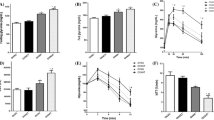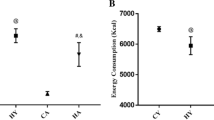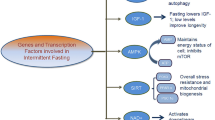Abstract
Conflicting reports of HRT necessitates exploration of therapeutic interventions with the least side effects to preserve metabolic homeodynamics in women later in life. The current study was designed to elucidate the cumulative effects of aging and/or high fat diet (HFD) on some metabolic indicators and their management by Tinospora cordifolia stem powder (TCP) using middle-aged acyclic and young adult cyclic female rats as the model system. Animals were fed on either normal chow or HFD supplemented with or without TCP. Blood and liver tissue were collected for biochemical, and histological studies as well as for expression of proteins regulating lipid metabolism. Animals fed with TCP supplemented normal chow feed showed bodyweight management over 12-weeks despite their high feed and calories intake compared to young and age-matched controls as well as HFD-fed animals. TCP dose used was not toxic and rather prevented age-associated liver dysfunctions and ameliorated dyslipidemia and oxidative stress, normalized blood glucose, insulin, leptin, and secretary pro-inflammatory cytokines. Further, bodyweight management effect of TCP was observed to target AMPK signalling pathway as the mediator of lipogenesis, sterol biosynthesis, lipolysis, and β-oxidation of fatty acids. These findings suggest that TCP supplementation in diet may be a potential interventional strategy to ameliorate aging-associated hepatic and metabolic dysfunctions and to promote healthy aging.
Graphical abstract







Similar content being viewed by others
Data availability
All data generated or analysed during this study are included in this article.
Abbreviations
- ACC:
-
Acetyl-CoA carboxylase
- ALT:
-
Alanine transaminase
- AMPK:
-
AMP-activated protein kinase
- AST:
-
Aspartate aminotransferase
- ATGL:
-
Adipose triglyceride lipase
- B-TCE:
-
Butanol extract of Tinospora cordifolia
- ERβ:
-
Estrogen receptor beta
- FAS:
-
Fatty acid synthase
- GSH:
-
Glutathione
- HDL:
-
High-density lipoprotein
- HFD:
-
High fat diet
- HM:
-
Middle-aged acyclic female rats fed on 30% high fat diet
- HMG-CoA reductase:
-
3-Hydroxy-3-methyl-glutaryl-coenzyme A reductase
- HRP:
-
Horseradish peroxidase
- HRT:
-
Hormone replacement therapy
- HTM:
-
Middle-aged acyclic female rats fed on TCP supplemented 30% high fat diet
- IDV:
-
Integrated density value
- IL-1β:
-
Interleukin1 beta
- IL-6:
-
Interleukin 6
- KCl:
-
Potassium chloride
- LM:
-
Middle-aged acyclic female rats fed on normal chow feed
- LTM:
-
Middle-aged acyclic female rats fed on TCP supplemented chow feed
- LY:
-
Young cyclic female rats fed on normal chow feed
- MCP-1:
-
Monocyte chemotactic protein-1
- PAI-1:
-
Plasminogen activator inhibitor1
- PPARs:
-
Peroxisome proliferator-activated receptors
- PVDF:
-
Polyvinylidene difluoride
- SAG:
-
Superoxide-anion generation
- SDS-PAGE:
-
Sodium dodecyl sulphate–Polyacrylamide gel electrophoresis
- SREBP1:
-
Sterol regulatory element-binding transcription factor 1
- TBARS:
-
Thiobarbituric acid reactive substances
- TBST:
-
Tris-buffered saline and Tween-20
- TCE:
-
Aqueous extract of Tinospora cordifolia
- TCP:
-
Dry stem powder of Tinospora cordifolia
- TG:
-
Triglycerides
- TNF-α:
-
Tumour necrosis factor alpha
References
Bajaj P, Singh H, Kalotra S, Kaur G (2021) Butanol extract of Tinospora cordifolia alleviates acute sleep deprivation-induced impairments in cognitive functions and neuromuscular coordination in middle-aged female rats. Neuromolecular Med. https://doi.org/10.1007/s12017-021-08683-x
Ban YH, Yon JM, Cha Y et al (2018) A hop extract lifenol® improves postmenopausal overweight, osteoporosis, and hot flash in ovariectomized Rats. Evid Based Complement Alternat Med. https://doi.org/10.1155/2018/2929107
Banin RM, Machado MMF, de Andrade IS et al (2021) Ginkgo biloba extract (GbE) attenuates obesity and anxious/depressive-like behaviours induced by ovariectomy. Sci Rep 11(1):44. https://doi.org/10.1038/s41598-020-78528-3
Barthem CS, Rossetti CL, Carvalho DP, da-Silva WS, (2019) Metformin ameliorates body mass gain and early metabolic changes in ovariectomized rats. Endocr Connect 8(12):1568–1578. https://doi.org/10.1530/EC-19-0470
Basurto L, Díaz A, Rodriguez A et al (2019) Circulating levels of plasminogen activator inhibitor-1 are associated with metabolic syndrome rather than with menopause. Gynecol Endocrinol 35(10):909–912. https://doi.org/10.1080/09513590.2019.1604658
Bjorklund BR (2015) The journey of adulthood, 8th edn. Pearson, Har- low, Essex
Buniam J, Chukijrungroat N, Khamphaya T, Weerachayaphorn J, Saengsirisuwan V (2019) Estrogen and voluntary exercise attenuate cardiometabolic syndrome and hepatic steatosis in ovariectomized rats fed a high-fat high-fructose diet. Am J PhysiolEndocrinolMetab 316(5):E908–E921. https://doi.org/10.1152/ajpendo.00466.2018
D’Eon TM, Souza SC, Aronovitz M, Obin MS, Fried SK, Greenberg AS (2005) Estrogen regulation of adiposity and fuel partitioning. Evidence of genomic and non-genomic regulation of lipogenic and oxidative pathways. J BiolChem 280(43):35983–35991. https://doi.org/10.1074/jbc.M507339200
Dhingra D, Lamba D, Kumar R, Nath P, Gauttam S (2014) Antihyperlipidemic activity of aloe succotrina in rats: possibly mediated by inhibition of HMG-CoA reductase. ISRN Pharmacol 2014:243575. https://doi.org/10.1155/2014/243575
Freeman EW, Sammel MD, Lin H, Gracia CR (2010) Obesity and reproductive hormone levels in the transition to menopause. Menopause 17(4):718–726. https://doi.org/10.1097/gme.0b013e3181cec85d
Herzig S, Shaw RJ (2018) AMPK: guardian of metabolism and mitochondrial homeostasis. Nat Rev Mol Cell Biol 19(2):121–135. https://doi.org/10.1038/nrm.2017.95
Huang HC, Lin JK (2012) Pu-erh tea, green tea, and black tea suppresses hyperlipidemia, hyperleptinemia and fatty acid synthase through activating AMPK in rats fed a high-fructose diet. Food Funct 3(2):170–177. https://doi.org/10.1039/c1fo10157a
Huang WT, Tu CY, Wang FY, Huang ST (2019) Literature review of liver injury induced by Tinospora crispa associated with two cases of acute fulminant hepatitis. Complement Ther Med 42:286–291. https://doi.org/10.1016/j.ctim.2018.11.028
Kamei Y, Suzuki M, Miyazaki H et al (2005) Ovariectomy in mice decreases lipid metabolism-related gene expression in adipose tissue and skeletal muscle with increased body fat. J NutrSciVitaminol 51(2):110–117. https://doi.org/10.3177/jnsv.51.110
Kaur T, Kaur G (2017) Withania somnifera as a potential candidate to ameliorate high fat diet-induced anxiety and neuroinflammation. J Neuroinflamm 14(1):201. https://doi.org/10.1186/s12974-017-0975-6
Kaushik A, Husain A, Awasthi H, Singh DP, Khan R, Mani D (2017) Antioxidant and hepatoprotective potential of Swaras and Hima extracts of Tinospora cordifolia and Boerhavia diffusa in Swiss albino mice. Pharmacogn Mag 13(Suppl 3):S658–S662. https://doi.org/10.4103/pm.pm_448_16
Kim J, Kim MH, Choi YY, Hong J, Yang WM (2016a) Inhibitory effects of Leonurus sibiricus on weight gain after menopause in ovariectomized and high-fat diet-fed mice. J Nat Med 70(3):522–530. https://doi.org/10.1007/s11418-016-0971-7
Kim J, Yang G, Kim Y, Kim J, Ha J (2016b) AMPK activators: mechanisms of action and physiological activities. Exp Mol Med 48(4):e224. https://doi.org/10.1038/emm.2016.16
Kim MR, Kim HJ, Yu SH et al (2020) Combination of red clover and hops extract improved menopause symptoms in an ovariectomized rat model. Evid Based Complement Alternat Med 2020:7941391. https://doi.org/10.1155/2020/7941391
Koebele SV, Bimonte-Nelson HA (2016) Modeling menopause: the utility of rodents in translational behavioral endocrinology research. Maturitas 87:5–17. https://doi.org/10.1016/j.maturitas.2016.01.015
Lee M, Katerelos M, Gleich K et al (2018) Phosphorylation of Acetyl-CoA carboxylase by AMPK reduces renal fibrosis and is essential for the anti-fibrotic effect of metformin. J Am SocNephrol 29(9):2326–2336. https://doi.org/10.1681/ASN.2018010050
Li Y, Xu S, Mihaylova MM et al (2011) AMPK phosphorylates and inhibits SREBP activity to attenuate hepatic steatosis and atherosclerosis in diet-induced insulin-resistant mice. Cell Metab 13(4):376–388. https://doi.org/10.1016/j.cmet.2011.03.009
Manchanda S, Kaur G (2017) Withania somnifera leaf alleviates cognitive dysfunction by enhancing hippocampal plasticity in high fat diet induced obesity model. BMC Complement Altern Med 17(1):136. https://doi.org/10.1186/s12906-017-1652-0
Mandar BK, Khanal P, Patil BM, Dey YN, Pasha I (2021) In silico analysis of phytoconstituents from Tinospora cordifolia with targets related to diabetes and obesity. In SilicoPharmacol 9(1):3. https://doi.org/10.1007/s40203-020-00063-w
Mayer LP, Pearsall NA, Christian PJ, Devine PJ, Payne CM, McCuskey MK, Marion SL, Sipes IG, Hoyer PB (2002) Long-term effects of ovarian follicular depletion in rats by 4-vinylcyclohexene diepoxide. Reprod Toxicol 16(6):775–781. https://doi.org/10.1016/s0890-6238(02)00048-5
Mayer LP, Devine PJ, Dyer CA, Hoyer PB (2004) The follicle-deplete mouse ovary produces androgen. Biol Reprod 71(1):130–138. https://doi.org/10.1095/biolreprod.103.016113
Mertens I, Ballaux D, Funahashi T, et al (2005) Inverse relationship between plasminogen activator inhibitor-I activity and adiponectin in overweight and obese women. Interrelationship with visceral adipose tissue, insulin resistance, HDL-chol and inflammation. Thromb Haemost 94(6):1190–1195
Michicotl-Meneses MM, Thompson-Bonilla MDR, Reyes-López CA et al (2021) Inflammation markers in adipose tissue and cardiovascular risk reduction by pomegranate juice in obesity induced by a hypercaloric diet in wistar rats. Nutrients 13(8):2577. https://doi.org/10.3390/nu13082577
Mishra R, Kaur G (2013) Aqueous ethanolic extract of Tinospora cordifolia as a potential candidate for differentiation based therapy of glioblastomas. PLoS ONE 8(10):e78764. https://doi.org/10.1371/journal.pone.0078764
Mishra R, Kaur G (2015) Tinospora cordifolia induces differentiation and senescence pathways in neuroblastoma cells. MolNeurobiol 52(1):719–733. https://doi.org/10.1007/s12035-014-8892-5
Mishra R, Manchanda S, Gupta M, Kaur T, Saini V, Sharma A, Kaur G (2016) Tinospora cordifolia ameliorates anxiety-like behavior and improves cognitive functions in acute sleep deprived rats. Sci Rep 6:25564. https://doi.org/10.1038/srep25564
Mori H, Nishteswar K, Patel BR, Nariya M (2016) Acute toxicity and antihyperlipidemic activity of rhizome of Tectaria coadunata (Kukkutnakhi): a folklore herb. Ayu 37(3–4):238–243. https://doi.org/10.4103/ayu.AYU_109_14
Munshi RP, Joshi SG, Rane BN (2014) Development of an experimental diet model in rats to study hyperlipidemia and insulin resistance, markers for coronary heart disease. Indian J Pharmacol 46(3):270–276. https://doi.org/10.4103/0253-7613.132156
Nam DE, Yun JM, Kim D, Kim OK (2019) Policosanol attenuates cholesterol synthesis via AMPK activation in hypercholesterolemic rats. J Med Food 22(11):1110–1117. https://doi.org/10.1089/jmf.2019.4491
Nanashima N, Horie K, Yamanouchi K et al (2020) Blackcurrant (Ribes nigrum) extract prevents dyslipidemia and hepatic steatosis in ovariectomized rats. Nutrients 12(5):1541. https://doi.org/10.3390/nu12051541
NIA (2015) Aged Rodent Colonies Handbook (Internet). https://www.nia.nih.gov/research/dab/aged-rodent-colonies-handbook. Accessed 05 April 2022
Palmisano BT, Zhu L, Stafford JM (2017) Role of estrogens in the regulation of liver lipid metabolism. AdvExp Med Biol 1043:227–256. https://doi.org/10.1007/978-3-319-70178-3_12
Paquette A, Wang D, Jankowski M, Gutkowska J, Lavoie JM (2008) Effects of ovariectomy on PPAR alpha, SREBP-1c, and SCD-1 gene expression in the rat liver. Menopause 15(6):1169–1175. https://doi.org/10.1097/gme.0b013e31817b8159
Prince PS, Padmanabhan M, Menon VP (2004) Restoration of antioxidant defence by ethanolic Tinospora cordifolia root extract in alloxan-induced diabetic liver and kidney. Phytother Res 18(9):785–787. https://doi.org/10.1002/ptr.1567
Quinn R (2005) Comparing rat’s to human’s age: how old is my rat in people years? Nutrition 6:775–777. https://doi.org/10.1016/j.nut.2005.04.002
Saengsirisuwan V, Pongseeda S, Prasannarong M, Vichaiwong K, Toskulkao C (2009) Modulation of insulin resistance in ovariectomized rats by endurance exercise training and estrogen replacement. Metabolism 58(1):38–47. https://doi.org/10.1016/j.metabol.2008.08.004
Saha S, Ghosh S (2012) Tinospora cordifolia: one plant, many roles. AncSci Life 31(4):151–159. https://doi.org/10.4103/0257-7941.107344
Sangeetha MK, BalajiRaghavendran HR, Gayathri V, Vasanthi HR (2011) Tinospora cordifolia attenuates oxidative stress and distorted carbohydrate metabolism in experimentally induced type 2 diabetes in rats. J Nat Med 65(3–4):544–550. https://doi.org/10.1007/s11418-011-0538-6
Saral S, Saydam F, Dokumacioglu E, Atak M, Tümkaya L, Uydu HA (2021) Effect of white tea consumption on serum leptin, TNF-α and UCP1 gene expression in ovariectomized rats. Eur Cytokine Netw 32(2):31–38. https://doi.org/10.1684/ecn.2021.0467
Sharma A, Kaur G (2018) Tinospora cordifolia as a potential neuroregenerative candidate against glutamate induced excitotoxicity: an in vitro perspective. BMC Complement Altern Med 18(1):268. https://doi.org/10.1186/s12906-018-2330-6
Sharma A, Kalotra S, Bajaj P, Singh H, Kaur G (2020) Butanol extract of Tinospora cordifolia ameliorates cognitive deficits associated with glutamate-induced excitotoxicity: a mechanistic study using hippocampal neurons. Neuromolecular Med 22(1):81–99. https://doi.org/10.1007/s12017-019-08566-2
Shen HH, Huang SY, Kung CW et al (2019) Genistein ameliorated obesity accompanied with adipose tissue browning and attenuation of hepatic lipogenesis in ovariectomized rats with high-fat diet. J Nutr Biochem 67:111–122. https://doi.org/10.1016/j.jnutbio.2019.02.001
Shim KS, Hwang YH, Jang SA, Kim T, Ha H (2021) Ethanol extract of Amomum tsao-ko ameliorates ovariectomy-induced trabecular loss and fat accumulation. Molecules 26(4):784. https://doi.org/10.3390/molecules26040784
Singh DP, Awasthi H, Luqman S, Singh S, Mani D (2015) Hepatoprotective effect of a polyherbal extract containing andrographis paniculata, Tinospora cordifolia and solanum nigrum against paracetamol induced hepatotoxicity. Pharmacogn Mag 11(Suppl 3):S375–S379. https://doi.org/10.4103/0973-1296.168945
Singh H, Sharma AK, Gupta M, Singh AP, Kaur G (2020) Tinospora cordifolia attenuates high fat diet-induced obesity and associated hepatic and renal dysfunctions in rats. Pharma Nutr. https://doi.org/10.1016/j.phanu.2020.100189
Singh H, Bajaj P, Kalotra S et al (2021) Tinospora cordifolia ameliorates brain functions impairments associated with high fat diet induced obesity. Neurochem Int 143:104937. https://doi.org/10.1016/j.neuint.2020.104937
Staels B, Fruchart JC (2005) Therapeutic roles of peroxisome proliferator-activated receptor agonists. Diabetes 54(8):2460–2470. https://doi.org/10.2337/diabetes.54.8.2460
Stanley DP, Shetty AK (2004) Aging in the rat hippocampus is associated with widespread reductions in the number of glutamate decarboxylase-67 positive interneurons but not interneuron degeneration. J Neurochem 89(1):204–216. https://doi.org/10.1111/j.1471-4159.2004.02318.x
Tang S, Shi Z, Qiao X et al (2021) Carya cathayensis leaf extract attenuates ectopic fat deposition in liver, abdomen and aortic arch in ovariectomized rats fed a high-fat diet. Phytomedicine. https://doi.org/10.1016/j.phymed.2020.153447
Tomicek NJ, Lancaster TS, Korzick DH (2011) Increased estrogen receptor β in adipose tissue is associated with increased intracellular and reduced circulating adiponectin protein levels in aged female rats. Gend Med 8(5):325–333. https://doi.org/10.1016/j.genm.2011.05.010
Upadhyay AK, Kumar K, Kumar A, Mishra HS (2010) Tinospora cordifolia (Willd.) Hook. f. and Thoms. (Guduchi) - validation of the Ayurvedic pharmacology through experimental and clinical studies. Int J Ayurveda Res 1(2):112–121. https://doi.org/10.4103/0974-7788.64405
Xing X, Su L, Asare PF et al (2016) Danzhi Qing’e (DZQE) activates AMPK pathway and regulates lipid metabolism in a rat model of perimenopausal hyperlipidaemia. Exp Physiol 101(11):1406–1417. https://doi.org/10.1113/EP085786
Funding
The current study was funded by the Department of Science & Technology under Cognitive Science Research Initiative- DST-CSRI, GOI grant to Prof. Gurcharan Kaur (DST/CSRI/2018/99). Anmol Bhandari is thankful to DST for the fellowship from this grant during the course of this work. This funding agency has no role in study designing, manuscript writing, and data interpretation.
Author information
Authors and Affiliations
Contributions
AB, AS and GK conceptualized the study; GK obtained the funding; experimentation was carried out by AB performed diet-induced obesity, bodyweight, caloric intake record, western blotting; AK, and AS performed liver function tests, oxidative stress markers, and histology study; HS helped in western blotting; AB, GK, and AS analysed the data and participated in the preparation of the manuscript. All authors have read and approved the final manuscript.
Corresponding author
Ethics declarations
Conflict of interest
Authors reported in this manuscript share no conflict of interest.
Ethical approval
Protocols for animal experimentation were approved (Reg. no. 266/2020/12) by the Institutional Animal Ethical Committee of Guru Nanak Dev University, Amritsar, India, and performed in compliance with the guidelines of ‘Animal Care and Use’ laid down by Institutional Animal Ethical Committee, Guru Nanak Dev University.
Additional information
Publisher's Note
Springer Nature remains neutral with regard to jurisdictional claims in published maps and institutional affiliations.
Rights and permissions
About this article
Cite this article
Bhandari, A., Sharma, A.K., Singh, H. et al. Aging-related changes in metabolic indicators in female rats and their management with Tinospora cordifolia. Biogerontology 23, 363–380 (2022). https://doi.org/10.1007/s10522-022-09962-1
Received:
Accepted:
Published:
Issue Date:
DOI: https://doi.org/10.1007/s10522-022-09962-1




